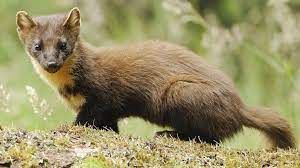Before humans started cutting down the forests of the UK, the pine marten was likely one of the most common carnivores in the UK. This voracious arboreal hunter is the reason that our resident squirrel is so acrobatic – these skills would likely be tested every day.
Indeed, pine martens are less widely spread in the USA which is likely one of the reasons that grey squirrels are so incapable of surviving alongside pine martens. Thus, in the UK we have this perverse situation within the UK, where the only refuge of the red squirrel (apart from small islands which can be cleared more easily) are areas of the country where pine martens also survive on.

In the UK, it has been long known that pine martens survive in Scotland. Protection of their forests must improve if we are to hold onto them for longer.
In recent years, they have been returned to central Wales and to the forest of Dean (latest survey in the forest of Dean found 40 pine martens here. It is hoped that these populations will connect, and that over the next few decades can gradually push grey squirrels out of existence on the UK. While this sounds harsh, it is essential – grey squirrels are from the USA, and apart from them killing red squirrels, they also damage many species of local tree.
Given their stronghold in Scotland and the north of England, experts initially could not believe a population appearing int he extreme south of the UK could be real. Back as far as 1993, there were reports of pine martens, however where they came from is now irrelevant. There is now a thriving population that is successfully breeding within the New forest. It is largely irrelevant who put them there, they are not essentially settled in 4 different parts of the forest.
A further release, potentially as early as next year, is intended to be made into Dartmoor national park in Hampshire. Along with Exmoor national park and a variety of other areas nearby, there seems to be plenty of prime habitat available through that.
Pine martens are back in England and should be celebrated. They were initially eradicated for the wealthy to enjoy bird shooting, but have ended up costing far more by their absence.
Possibly in 50 years, they will have returned to much of the remaining forests of the UK only thine will tell.











